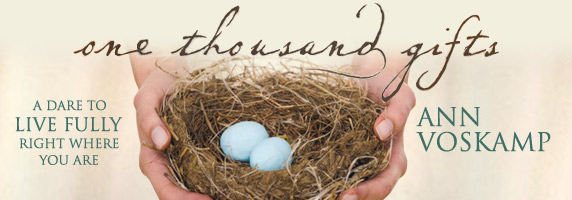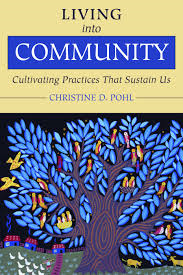Voskamp vs Pohl on Gratitude

April 7, 2016
A couple of weeks ago I shared some thoughts I had after reading Christine Pohl’s first chapter to her book Living Into Community: Cultivating Practices that Sustain Us. Particularly, I questioned whether the wider, Reformed-ish community is sustainable. After now finishing her first three chapters on gratitude, I have found some rich teaching that has led me to further reflection. I like a book that makes me think further on my own.
One thing that I have noticed is how different Pohl’s writing on gratitude is to another very popular book on the topic. It has perplexed me how even prominent voices in the Reformed community have helped to promote Ann Voskamp’s One Thousand Gifts, despite the concerning theological problems in her teaching on gratitude. It led me to conclude that maybe gratitude is a topic that hasn’t been written about enough.

Besides the writing style, one stark difference that I find between Pohl’s approach to teaching about gratitude and VosKamp’s is that Pohl is discussing gratitude as a practice within a community in response to our gratitude for God, whereas VosKamp’s approach is more an individualistic means to experience her own personal fullness of salvation. In just three chapters, I was both encouraged and challenged by Pohl. She first addresses how gratitude is a function of being made in the image of God, along with noting humility in our capacity to be thankful
 in hard times when we don’t have all the answers, and the ungrateful postures of dissatisfaction and entitlement. Her second chapter on gratitude covers complications that come along with gratitude in relationships, such as manipulation in giving, dependence on another in receiving a gift, the connections between gratitude and justice, and practicing gratitude in a community of broken people. She then gets into the practical applications of what weakens and strengthens gratitude.
in hard times when we don’t have all the answers, and the ungrateful postures of dissatisfaction and entitlement. Her second chapter on gratitude covers complications that come along with gratitude in relationships, such as manipulation in giving, dependence on another in receiving a gift, the connections between gratitude and justice, and practicing gratitude in a community of broken people. She then gets into the practical applications of what weakens and strengthens gratitude.Pohl said something that stuck with me when discussing how our busyness and ambitions hinder our capacity to pause and take notice of God’s gifts. She mentioned “important but overlooked connections between Sabbath and gratitude” (30). Pohl wrote this in her closing of Chapter Two, but I found myself wanting to read a whole chapter, or even book, on those connections. Within the context that she was addressing, Pohl explains, “Schedules have no space to accommodate things going wrong, and we are unable to receive any gift that might come in the form of an interruption” (30). This is a good observation. Sunday does come as an interruption to us. As we are busy serving in our vocations, we tend to fall into our default of building our own kingdoms. But our Sabbath worship is an interruption of the age to come that is breaking into this age that is wasting away. And we are reminded that we are receivers.
I connected this to what Pohl later wrote about the strings that are attached to gifts. She says, “Centuries ago, Seneca wisely warned that ‘one should never accept a gift if one would be ashamed to acknowledge the debt publicly (Ben 2.23.1); a gift should be accepted only if the recipient is willing to ‘invite the whole city to witness it’’” (40). Isn’t this in a sense what we are summoned to do on Sunday? We are called out from our workweek to accept God’s gifts to us of the preached Word and the sacraments, as a covenant community. The whole city witnesses our leaving behind the common activities of life for sacred worship. Sabbath reminds us that we are to rest in Christ. It “is both a response of gratitude and a context for gratitude” (57). God forbid we would not respond by assembling together and receiving his gifts to us.
I remember listening to Tim Keller once talking about a woman who had been visiting his church for a short time. She approached him after a service, explaining that she had gone to church her whole life and never heard the message of grace that he was preaching before. She wanted to know why. Keller said that he turned the question back to her, asking why she thought this gospel message had not been preached. The woman’s response was both simple and profound. She said that if this message of salvation by grace alone was true, then there was nothing that God could not ask her for that she would not have to obey.
We would like God to owe us for our own goodness and accomplishments. This woman understood that receiving the gift of salvation established a new relationship. As Pohl put it, “To be grateful is to put ourselves in the position of a recipient---gratitude reminds us that we are dependent on others” (32). And this woman perceived what it means to be delivered from the reign of sin and to be placed under the reign of grace. She was a new creation, and she owed her life to God. That is our joy as we see that he has given us himself.
I would recommend Pohl’s three chapters on gratitude to all those who recommend or ask about Ann Voskamp’s One Thousand Gifts with the hope that the reader would be confronted with a more accurate and enriching teaching---one that doesn’t see gratitude as a means to experience fulfilled communion with God in this age, but that “celebrates life and community” because we look forward to that “experience of total communion” that is to come (55,56). Gratitude is a way of life for those who recognize the “true Gift.”




